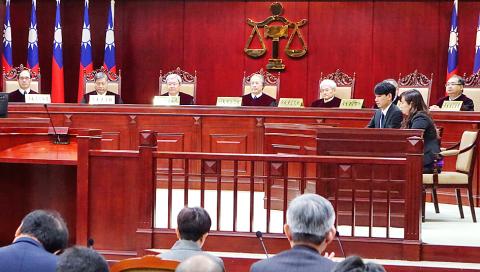In an unprecedented move, the Council of Grand Justices yesterday announced that it would broadcast live a debate next month on the issue of same-sex marriage from the perspective of a constitutional interpretation.
Legal professionals and four academics are to participate in the debate, which is scheduled for 9:30am on March 24, it said.
The debate will address two requests for a constitutional interpretation on the issue of same-sex marriage, the council said, adding that the cases were filed by the Taipei City Government and gay rights advocate Chi Chia-wei (祁家威).

Photo: Liu Hsin-de, Taipei Times
Chi is widely known as one of the nation’s pioneers in the fight for marriage equality, having first sought recognition of his union with his partner 16 years ago through a constitutional review of the nation’s marriage laws, in which he was defeated.
Three years ago, Chi initiated a second attempt, which also met with failure, despite having the support of the Taiwan Alliance to Promote Civil Partnership Rights and more than a dozen lawyers. That case was defeated in the Supreme Court in August 2015.
The March 24 debate would be Chi’s third request for a constitutional review of the nation’s marriage laws.
The other constitutional interpretation requested was filed by the Taipei City Government’s Bureau of Civil Affairs, which has been receiving an increasing number of same-sex marriage registration requests since Chi’s second appeal.
Taiwan Tongzhi Hotline Association research associate Lu Hsin-chieh (呂欣潔) and her partner, in addition to two other same-sex couples, filed an administrative lawsuit against the bureau after their marriage applications were rejected.
The bureau in 2015 filed for a constitutional interpretation in response.

Seventy percent of middle and elementary schools now conduct English classes entirely in English, the Ministry of Education said, as it encourages schools nationwide to adopt this practice Minister of Education (MOE) Cheng Ying-yao (鄭英耀) is scheduled to present a report on the government’s bilingual education policy to the Legislative Yuan’s Education and Culture Committee today. The report would outline strategies aimed at expanding access to education, reducing regional disparities and improving talent cultivation. Implementation of bilingual education policies has varied across local governments, occasionally drawing public criticism. For example, some schools have required teachers of non-English subjects to pass English proficiency

‘FORM OF PROTEST’: The German Institute Taipei said it was ‘shocked’ to see Nazi symbolism used in connection with political aims as it condemned the incident Sung Chien-liang (宋建樑), who led efforts to recall Democratic Progressive Party (DPP) Legislator Lee Kun-cheng (李坤城), was released on bail of NT$80,000 yesterday amid an outcry over a Nazi armband he wore to questioning the night before. Sung arrived at the New Taipei City District Prosecutors’ Office for questioning in a recall petition forgery case on Tuesday night wearing a red armband bearing a swastika, carrying a copy of Adolf Hitler’s Mein Kampf and giving a Nazi salute. Sung left the building at 1:15am without the armband and apparently covering the book with a coat. This is a serious international scandal and Chinese

PERSONAL DATA: The implicated KMT members allegedly compiled their petitions by copying names from party lists without the consent of the people concerned Judicial authorities searched six locations yesterday and questioned six people, including one elderly Chinese Nationalist Party (KMT) member and five KMT Youth League associates, about alleged signature forgery and fraud relating to their recall efforts against two Democratic Progressive Party (DPP) legislators. After launching a probe into alleged signature forgery and related fraud in the KMT’s recall effort, prosecutors received a number of complaints, including about one petition that had 1,748 signatures of voters whose family members said they had already passed away, and also voters who said they did not approve the use of their name, Taipei Deputy Chief Prosecutor

TRADE: The premier pledged safeguards on ‘Made in Taiwan’ labeling, anti-dumping measures and stricter export controls to strengthen its position in trade talks Products labeled “made in Taiwan” must be genuinely made in Taiwan, Premier Cho Jung-tai (卓榮泰) said yesterday, vowing to enforce strict safeguards against “origin laundering” and initiate anti-dumping investigations to prevent China dumping its products in Taiwan. Cho made the remarks in a discussion session with representatives from industries in Kaohsiung. In response to the US government’s recent announcement of “reciprocal” tariffs on its trading partners, President William Lai (賴清德) and Cho last week began a series of consultations with industry leaders nationwide to gather feedback and address concerns. Taiwanese and US officials held a videoconference on Friday evening to discuss the